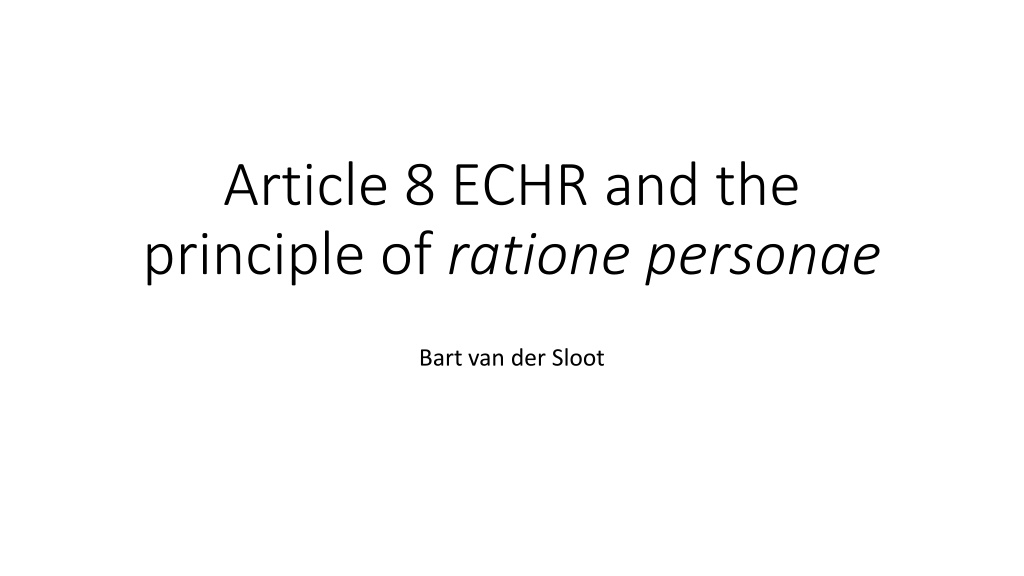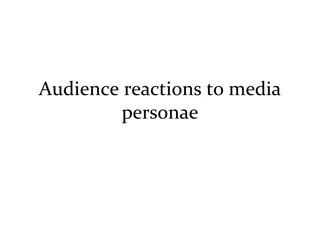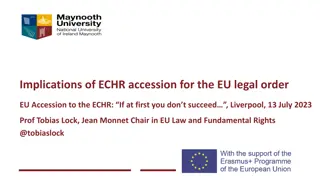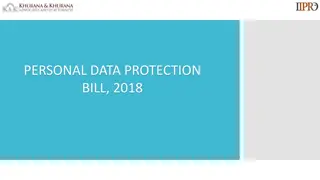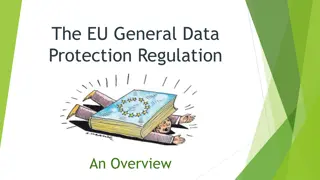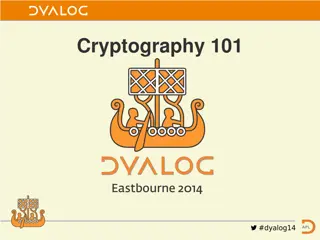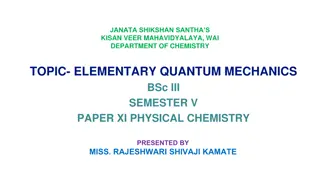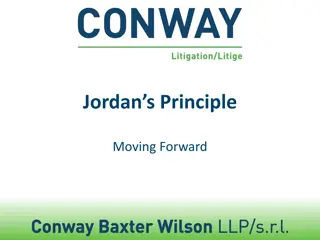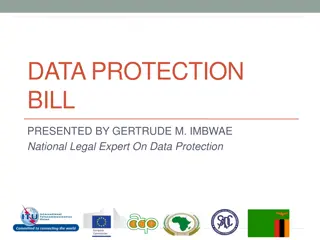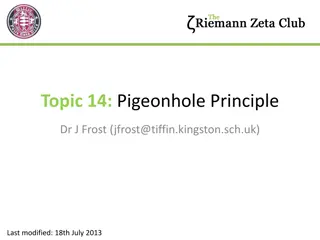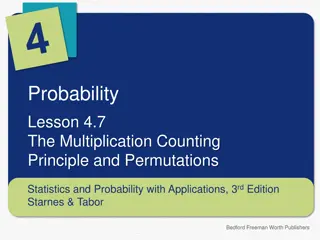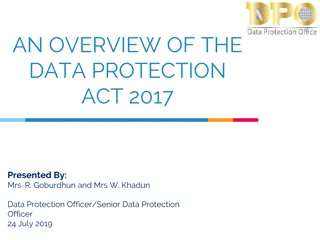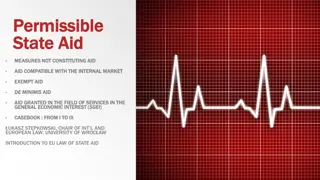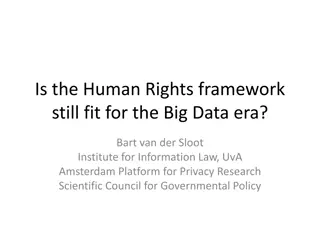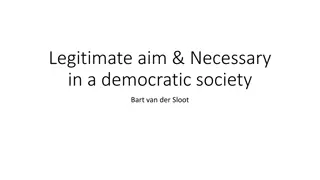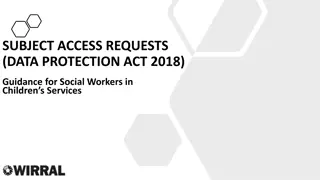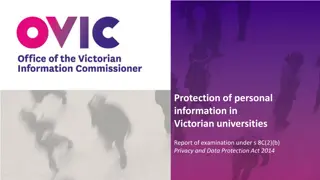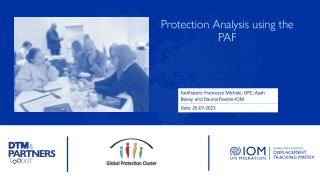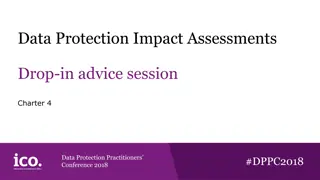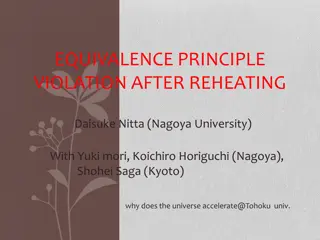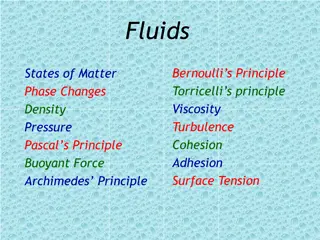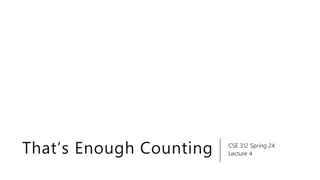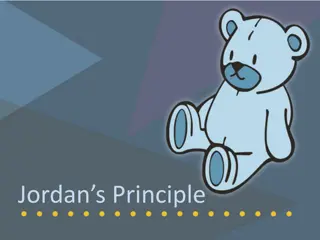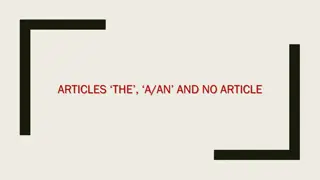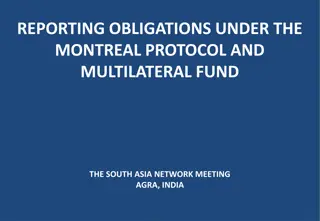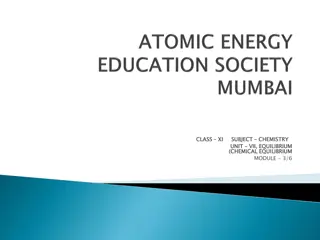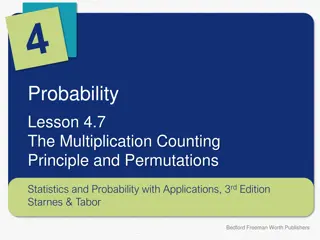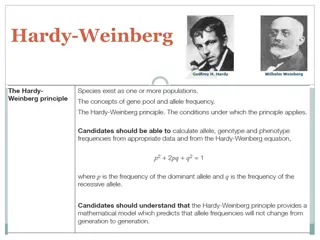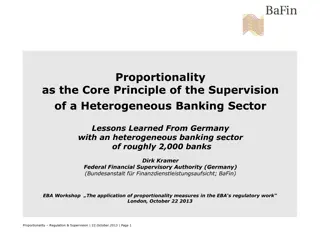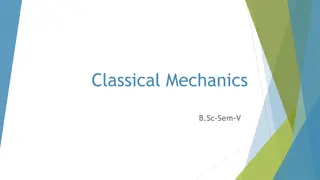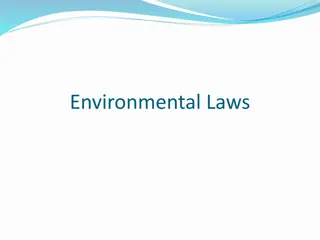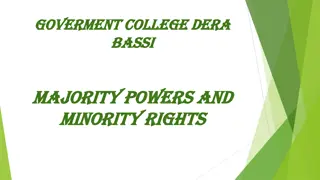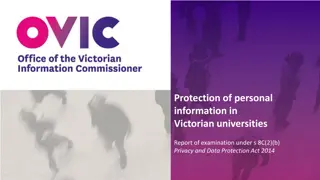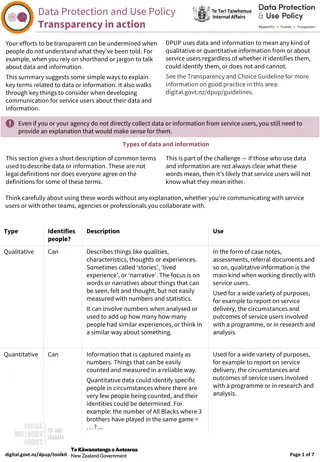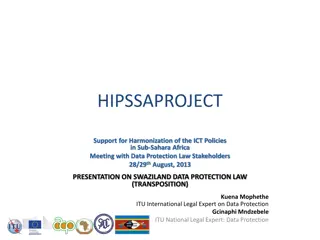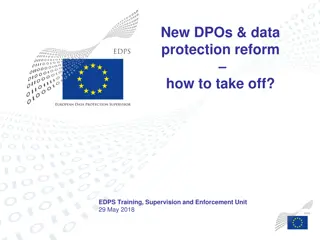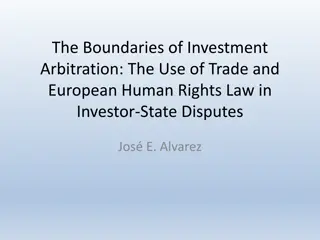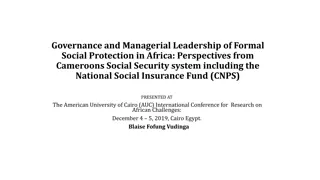Protection of Personal Data under Article 8 ECHR and Ratione Personae Principle
The article delves into the significance of Article 8 ECHR and the principle of ratione personae as discussed by Bart van der Sloot. It emphasizes the right to respect for private and family life, protection of personal data, and the limitations on interference by public authorities. The discussion also includes aspects of privacy infringements, harm, and standing in relation to privacy rights under the European Convention on Human Rights.
Download Presentation

Please find below an Image/Link to download the presentation.
The content on the website is provided AS IS for your information and personal use only. It may not be sold, licensed, or shared on other websites without obtaining consent from the author. Download presentation by click this link. If you encounter any issues during the download, it is possible that the publisher has removed the file from their server.
E N D
Presentation Transcript
Article 8 ECHR and the principle of ratione personae Bart van der Sloot
Overview EU > Council of Europe
Overview Data Protection > Privacy ARTICLE 8 ECHR Right to respect for private and family life 1. Everyone has the right to respect for his private and family life, his home and his correspondence. 2. There shall be no interference by a public authority with the exercise of this right except such as is in accordance with the law and is necessary in a democratic society in the interests of national security, public safety or the economic well-being of the country, for the prevention of disorder or crime, for the protection of health or morals, or for the protection of the rights and freedoms of others.
Overview Article 7 Respect for private and family life Everyone has the right to respect for his or her private and family life, home and communications. Article 8 Protection of personal data 1. Everyone has the right to the protection of personal data concerning him or her. 2. Such data must be processed fairly for specified purposes and on the basis of the consent of the person concerned or some other legitimate basis laid down by law. Everyone has the right of access to data which has been collected concerning him or her, and the right to have it rectified. 3. Compliance with these rules shall be subject to control by an independent authority.
Overview 25 September 2018 26 September 2018 2 October 2018 3 October 2018 > Ratione personae > Ratione materiae > Statistical overview & Prescribed by law > Legitimate interest & Necessary in a Democratic Society
Overview 25 September 2017 During this class, we will discuss the notion of harm, standing and ratione personae in relation to privacy infringements. What type of harm does a privacy infringement inflict, how can one prove harm and the causal relationship between harm and the infringement? Is harm necessary for claiming a right under the European Convention on Human Rights? Mandatory literature: Admissibility guide, pages 1-45: http://www.echr.coe.int/Documents/Admissibility_guide_ENG.pdf B. van der Sloot, Is the Human Rights Framework Still Fit for the Big Data Era? A Discussion of the ECtHR s Case Law on Privacy Violations Arising from Surveillance Activities , https://link.springer.com/chapter/10.1007%2F978-94-017-7376-8_15 Optional literature: European Convention on Human Rights (http://www.echr.coe.int/Documents/Convention_ENG.pdf) Articles 8 and articles 19-51. Original European Convention on Human Rights, articles 21-56 (http://www.echr.coe.int/Documents/Collection_Convention_1950_ENG.pdf) Traveaux preparatoire Article 8 ECHR: http://www.echr.coe.int/LibraryDocs/Travaux/ECHRTravaux-ART8-DH(56)12-EN1674980.pdf Teacher: Bart van der Sloot
Overview 26 September 2017 During this class, we will discuss what exactly falls under the notion of privacy. Is privacy a negative or a positive right, a negative or a positive obligation and does it protect one s freedom, one s dignity or the development of one s personality? And what is the difference between the material scope of the right to data protection and the right to privacy? Mandatory literature: Admissibility guide, pages 45-97: http://www.echr.coe.int/Documents/Admissibility_guide_ENG.pdf B. van der Sloot, Privacy as Personality Right: Why the ECtHR's Focus on Ulterior Interests Might Prove Indispensable in the Age of Big Data , http://bartvandersloot.com/onewebmedia/Utrect.pdf Optional literature: Data Protection: http://www.echr.coe.int/Documents/FS_Data_ENG.pdf Mass surveillance: http://www.echr.coe.int/Documents/FS_Mass_surveillance_ENG.pdf Teacher: Bart van der Sloot
Overview 2 October 2017 During this class, we will give a statistical overview of ECtHR case law and discuss one of the three conditions for limiting the right to privacy under the European Convention on Human Rights. Namely that the limitation is prescribed by law. Mandatory literature: B. van der Sloot, Where is the harm in a privacy violation? Calculating the damages afforded in privacy cases by the European Court of Human Rights http://bartvandersloot.com/onewebmedia/Bart%20van%20der%20Sloot% 20-%20PLSC.pdf Teacher: Bart van der Sloot
Overview 3 October 2017 During this class, we will discuss the second and third condition for legitimately curtailing the right to privacy, namely that the limitation should be in a public interest and necessary in a democratic society. What does this notion entail? How does it relate to the proportionality and subsidiarity principle? And does it require a form of balancing? Mandatory literature: B. van der Sloot, How to assess privacy violations in the age of Big Data? Analysing the three different tests developed by the ECtHR and adding for a fourth one , http://www.tandfonline.com/doi/full/10.1080/13600834.2015.1009714 B. van der Sloot, The Practical and Theoretical Problems with Balancing , Delfi, Coty and the Redundancy of the Human Rights Framework , http://bartvandersloot.com/onewebmedia/Balancing.pdf B. van der Sloot, Ten Questions about balancing , http://bartvandersloot.com/onewebmedia/ten%20questions.pdf Teacher: Bart van der Sloot
Overview of this week Article 8 ECHR and the principle of ratione personae (1) Background of ECHR (2) Procedural aspects of ECHR (3) Break (4) First phase of ratione personae under Article 8 ECHR (5) Second phase of ratione personae under Article 8 ECHR (6) Third phase of ratione personae under Article 8 ECHR
Blog and essay Blog: Write a blog about a case that has been assigned to you. 10% of your final grade. Only Sufficient Insufficient. Essay: 25% of the grade for the written exam. Example: Mr. B. and mr. P. are discussing two judgements delivered by the European Court of Human Rights. B. argues that Delfi AS v. Estonia shows the redundancy of the human rights framework. Mr. P., however, suggests that the Zakharov v. Russia case also falls outside the normal conception of human rights and the classic task of a human rights court. In Zakharov, there was no harm inflicted on the applicants so where is the human rights infringement?, mr. P. asks mr. B. Write a hypothetical dialogue between mr. B. and mr. P., in which you develop new ideas, raise critical questions and/or create difficult dilemma s (max. 2.000 words).
Earlier Human Rights documents Magna Carta 1215 Bill of Rights 1689 United States Bill of Rights 1789 The Declaration of the Rights of Man and of the Citizen 1789
Modern Human Rights Documents Universal Declaration of Human Rights (UDHR) 1948 International Covenant on Civil and Political Rights 1966 European Convention on Human Rights 1950 American Convention on Human Rights 1969 African Charter on Human and Peoples' Rights 1981 EU Charter of Fundamental Rights 2000 Association of Southeast Asian Nations (ASEAN) Human Rights Declaration 2012
Background Atrocities of Second World War Fascist and Communist regimes
Universal Declaration of Human Rights (UDHR) 1948 Article 12 No one shall be subjected to arbitrary interference with his privacy, family, home or correspondence, nor to attacks upon his honour and reputation. Everyone has the right to the protection of the law against such interference or attacks Article 16 (1) Men and women of full age, without any limitation due to race, nationality or religion, have the right to marry and to found a family. They are entitled to equal rights as to marriage, during marriage and at its dissolution. (2) Marriage shall be entered into only with the free and full consent of the intending spouses. (3) The family is the natural and fundamental group unit of society and is entitled to protection by society and the State.
International Covenant on Civil and Political Rights 1966 Article 17 1. No one shall be subjected to arbitrary or unlawful interference with his privacy, family, home or correspondence, nor to unlawful attacks on his honour and reputation. 2. Everyone has the right to the protection of the law against such interference or attacks. Article 23 1. The family is the natural and fundamental group unit of society and is entitled to protection by society and the State. 2. The right of men and women of marriageable age to marry and to found a family shall be recognized. 3. No marriage shall be entered into without the free and full consent of the intending spouses. 4. States Parties to the present Covenant shall take appropriate steps to ensure equality of rights and responsibilities of spouses as to marriage, during marriage and at its dissolution. In the case of dissolution, provision shall be made for the necessary protection of any children.
European Convention on Human Rights 1950 ARTICLE 8 Right to respect for private and family life 1. Everyone has the right to respect for his private and family life, his home and his correspondence. 2. There shall be no interference by a public authority with the exercise of this right except such as is in accordance with the law and is necessary in a democratic society in the interests of national security, public safety or the economic well-being of the country, for the prevention of disorder or crime, for the protection of health or morals, or for the protection of the rights and freedoms of others. ARTICLE 12 Right to marry Men and women of marriageable age have the right to marry and to found a family, according to the national laws governing the exercise of this right.
American Convention on Human Rights 1969 Article 11. Right to Privacy 1. Everyone has the right to have his honor respected and his dignity recognized. 2. No one may be the object of arbitrary or abusive interference with his private life, his family, his home, or his correspondence, or of unlawful attacks on his honor or reputation. 3. Everyone has the right to the protection of the law against such interference or attacks. Article 17. Rights of the Family 1. The family is the natural and fundamental group unit of society and is entitled to protection by society and the state. 2. The right of men and women of marriageable age to marry and to raise a family shall be recognized, if they meet the conditions required by domestic laws, insofar as such conditions do not affect the principle of nondiscrimination established in this Convention. 3. No marriage shall be entered into without the free and full consent of the intending spouses. 4. The States Parties shall take appropriate steps to ensure the equality of rights and the adequate balancing of responsibilities of the spouses as to marriage, during marriage, and in the event of its dissolution. In case of dissolution, provision shall be made for the necessary protection of any children solely on the basis of their own best interests. 5. The law shall recognize equal rights for children born out of wedlock and those born in wedlock. Article 18. Right to a Name Every person has the right to a given name and to the surnames of his parents or that of one of them. The law shall regulate the manner in which this right shall be ensured for all, by the use of assumed names if necessary. Article 19. Rights of the Child Every minor child has the right to the measures of protection required by his condition as a minor on the part of his family, society, and the state.
African Charter on Human and Peoples' Rights 1981 Article 18 1. The family shall be the natural unit and basis of society. It shall be protected by the State which shall take care of its physical health and moral. 2. The State shall have the duty to assist the family which is the custodian of morals and traditional values recognized by the community. 3. The State shall ensure the elimination of every discrimination against women and also censure the protection of the rights of the woman and the child as stipulated in international declarations and conventions. 4. The aged and the disabled shall also have the right to special measures of protection in keeping with their physical or moral needs.
EU Charter of Fundamental Rights 2000 Article 3 Right to the integrity of the person 1. Everyone has the right to respect for his or her physical and mental integrity. 2. In the fields of medicine and biology, the following must be respected in particular: -the free and informed consent of the person concerned, according to the procedures laid down by law, the prohibition of eugenic practices, in particular those aiming at the selection of persons, the prohibition on making the human body and its parts as such a source of financial gain, the prohibition of the reproductive cloning of human beings. Article 7 Respect for private and family life Everyone has the right to respect for his or her private and family life, home and communications. Article 8 Protection of personal data 1. Everyone has the right to the protection of personal data concerning him or her. 2. Such data must be processed fairly for specified purposes and on the basis of the consent of the person concerned or some other legitimate basis laid down by law. Everyone has the right of access to data which has been collected concerning him or her, and the right to have it rectified. 3. Compliance with these rules shall be subject to control by an independent authority. Article 9 Right to marry and right to found a family The right to marry and the right to found a family shall be guaranteed in accordance with the national laws governing the exercise of these rights.
Association of Southeast Asian Nations (ASEAN) Human Rights Declaration 2012 Article 19 The family as the natural and fundamental unit of society is entitled to protection by society and each ASEAN Member State. Men and Woman of full age have the right to marry on the basis of their free and full consent, to found a family and to dissolve a marriage, as prescribed by law.
General characteristics of the ECHR Complaints against states Inter-State complaints & individual complaints (natural persons, legal persons & groups)
Discussions when drafting the ECHR A Commission, a Court or both? Excessive legalism Would a legal court work? Would a decission by the Commission be enough?
Discussions when drafting the ECHR Individual complaints at all?
Discussions when drafting the ECHR Civil and Political Rights and Socio-Economic Rights? > First Protocol ARTICLE 1 Protection of property Every natural or legal person is entitled to the peaceful enjoyment of his possessions. No one shall be deprived of his possessions except in the public interest and subject to the conditions provided for by law and by the general principles of international law. The preceding provisions shall not, however, in any way impair the right of a State to enforce such laws as it deems necessary to control the use of property in accordance with the general interest or to secure the payment of taxes or other contributions or penalties. ARTICLE 2 Right to education No person shall be denied the right to education. In the exercise of any functions which it assumes in relation to education and to teaching, the State shall respect the right of parents to ensure such education and teaching in conformity with their own religious and philosophical convictions. ARTICLE 3 Right to free elections The High Contracting Parties undertake to hold free elections at reasonable intervals by secret ballot, under conditions which will ensure the free expression of the opinion of the people in the choice of the legislature.
Discussions when drafting the ECHR General limmitation clause
Discussions when drafting the ECHR Should the right to privacy refer to private property? Privacy or private life Right to reputation? ARTICLE 10 Freedom of expression 1. Everyone has the right to freedom of expression. This right shall include freedom to hold opinions and to receive and impart information and ideas without interference by public authority and regardless of frontiers. This Article shall not prevent States from requiring the licensing of broadcasting, television or cinema enterprises. 2. The exercise of these freedoms, since it carries with it duties and responsibilities, may be subject to such formalities, conditions, restrictions or penalties as are prescribed by law and are necessary in a democratic society, in the interests of national security, territorial integrity or public safety, for the prevention of disorder or crime, for the protection of health or morals, for the protection of the reputation or rights of others, for preventing the disclosure of information received in confidence, or for maintaining the authority and impartiality of the judiciary
Important changes General interests > individual interests General complaints > complaints by natural persons Quasi horizontal application Necessity test > balancing test Living instrument > enlarged scope of the Convention Not even a Court of fourth instance > Court of First Instance
Important changes Protocol No. 9 to the Convention for the Protection of Human Rights and Fundamental Freedoms Rome, 6.XI.1990 Article 44 of the Convention shall read as follows: "Only the High Contracting Parties, the Commission, and persons, non-governmental organisations or groups of individuals having submitted a petition under Article 25 shall have the right to bring a case before the Court." Article 45 of the Convention shall read as follows: "The jurisdiction of the Court shall extend to all cases concerning the interpretation and application of the present Convention which are referred to it in accordance with Article 48." Article 48 of the Convention shall read as follows: "1The following may refer a case to the Court, provided that the High Contracting Party concerned, if there is only one, or the High Contracting Parties concerned, if there is more than one, are subject to the compulsory jurisdiction of the Court or, failing that, with the consent of the High Contracting Party concerned, if there is only one, or of the High Contracting Parties concerned if there is more than one: athe Commission; ba High Contracting Party whose national is alleged to be a victim; ca High Contracting Party which referred the case to the Commission; da High Contracting Party against which the complaint has been lodged; ethe person, non-governmental organisation or group of individuals having lodged the complaint with the Commission. 2If a case is referred to the Court only in accordance with paragraph 1.e, it shall first be submitted to a panel composed of three members of the Court. There shall sit as an ex officio member of the panel the judge elected in respect of the High Contracting Party against which the complaint has been lodged, or, if there is none, a person of its choice who shall sit in the capacity of judge. If the complaint has been lodged against more than one High Contracting Party, the size of the panel shall be increased accordingly. If the case does not raise a serious question affecting the interpretation or application of the Convention and does not for any other reason warrant consideration by the Court, the panel may, by a unanimous vote, decide that it shall not be considered by the Court. In that event, the Committee of Ministers shall decide, in accordance with the provisions of Article 32, whether there has been a violation of the Convention."
Important changes Protocol No. 11 to the Convention for the Protection of Human Rights and Fundamental Freedoms, restructuring the control machinery established thereby Strasbourg, 11.V.1994 Article 26 Plenary Court The plenary Court shall: aelect its President and one or two Vice-Presidents for a period of three years; they may be re-elected; bset up Chambers, constituted for a fixed period of time; celect the Presidents of the Chambers of the Court; they may be re-elected; dadopt the rules of the Court; and eelect the Registrar and one or more Deputy Registrars. Article 27 Committees, Chambers and Grand Chamber 1To consider cases brought before it, the Court shall sit in committees of three judges, in Chambers of seven judges and in a Grand Chamber of seventeen judges. The Court s Chambers shall set up committees for a fixed period of time. 2There shall sit as an ex officio member of the Chamber and the Grand Chamber the judge elected in respect of the State Party concerned or, if there is none or if he is unable to sit, a person of its choice who shall sit in the capacity of judge. 3The Grand Chamber shall also include the President of the Court, the Vice-Presidents, the Presidents of the Chambers and other judges chosen in accordance with the rules of the Court. When a case is referred to the Grand Chamber under Article 43, no judge from the Chamber which rendered the judgment shall sit in the Grand Chamber, with the exception of the President of the Chamber and the judge who sat in respect of the State Party concerned.
Important changes Protocol No. 14 to the Convention for the Protection of Human Rights and Fundamental Freedoms, amending the control system of the Convention Strasbourg, 13.V.2004 Article 26 Single-judge formation, committees, Chambers and Grand Chamber 1To consider cases brought before it, the Court shall sit in a single-judge formation, in committees of three judges, in Chambers of seven judges and in a Grand Chamber of seventeen judges. The Court s Chambers shall set up committees for a fixed period of time. 2At the request of the plenary Court, the Committee of Ministers may, by a unanimous decision and for a fixed period, reduce to five the number of judges of the Chambers. 3When sitting as a single judge, a judge shall not examine any application against the High Contracting Party in respect of which that judge has been elected. 4There shall sit as an ex officio member of the Chamber and the Grand Chamber the judge elected in respect of the High Contracting Party concerned. If there is none or if that judge is unable to sit, a person chosen by the President of the Court from a list submitted in advance by that Party shall sit in the capacity of judge. 5The Grand Chamber shall also include the President of the Court, the Vice-Presidents, the Presidents of the Chambers and other judges chosen in accordance with the rules of the Court. When a case is referred to the Grand Chamber under Article 43, no judge from the Chamber which rendered the judgment shall sit in the Grand Chamber, with the exception of the President of the Chamber and the judge who sat in respect of the High Contracting Party concerned.
Important changes Protocol No. 15 amending the Convention for the Protection of Human Rights and Fundamental Freedoms Strasbourg, 24.VI.2013 In Article 35, paragraph 1 of the Convention, the words within a period of six months shall be replaced by the words within a period of four months .
Important changes Protocol No. 16 to the Convention for the Protection of Human Rights and Fundamental Freedoms Strasbourg, 2.X.2013 1Highest courts and tribunals of a High Contracting Party, as specified in accordance with Article 10, may request the Court to give advisory opinions on questions of principle relating to the interpretation or application of the rights and freedoms defined in the Convention or the protocols thereto. 2The requesting court or tribunal may seek an advisory opinion only in the context of a case pending before it. 3The requesting court or tribunal shall give reasons for its request and shall provide the relevant legal and factual background of the pending case.
(2) Procedural aspects of ECHR ARTICLE 19 Establishment of the Court To ensure the observance of the engagements undertaken by the High Contracting Parties in the Convention and the Protocols thereto, there shall be set up a European Court of Human Rights, hereinafter referred to as the Court . It shall function on a permanent basis. ARTICLE 20 Number of judges The Court shall consist of a number of judges equal to that of the High Contracting Parties.
(2) Procedural aspects of ECHR ARTICLE 21 Criteria for office 1. The judges shall be of high moral character and must either possess the qualifications required for appointment to high judicial office or be jurisconsults of recognised competence. 2. The judges shall sit on the Court in their individual capacity. 3. During their term of office the judges shall not engage in any activity which is incompatible with their independence, impartiality or with the demands of a full-time office; all questions arising from the application of this paragraph shall be decided by the Court. ARTICLE 22 Election of judges The judges shall be elected by the Parliamentary Assembly with respect to each High Contracting Party by a majority of votes cast from a list of three candidates nominated by the High Contracting Party.
(2) Procedural aspects of ECHR ARTICLE 23 Terms of office and dismissal 1. The judges shall be elected for a period of nine years. They may not be re-elected. 2. The terms of office of judges shall expire when they reach the age of 70. 3. The judges shall hold office until replaced. They shall, however, continue to deal with such cases as they already have under consideration. judges decide by a majority of two-thirds that that judge has ceased to fulfil the required conditions. ARTICLE 24 Registry and rapporteurs 1. The Court shall have a Registry, the functions and organisation of which shall be laid down in the rules of the Court. 2. When sitting in a single-judge formation, the Court shall be assisted by rapporteurs who shall function under the authority of the President of the Court. They shall form part of the Court s Registry.
(2) Procedural aspects of ECHR ARTICLE 25 Plenary Court The plenary Court shall (a) elect its President and one or two Vice-Presidents for a period of three years; they may be re-elected; (b) set up Chambers, constituted for a fixed period of time; (c) elect the Presidents of the Chambers of the Court; they may be re-elected; (d) adopt the rules of the Court; (e) elect the Registrar and one or more Deputy Registrars; (f) make any request under Article 26, paragraph 2. ARTICLE 26 Single-judge formation, Committees, Chambers and Grand Chamber 1. To consider cases brought before it, the Court shall sit in a single-judge formation, in committees of three judges, in Chambers of seven judges and in a Grand Chamber of seventeen judges. The Court s Chambers shall set up committees for a fixed period of time. 2. At the request of the plenary Court, the Committee of Ministers may, by a unanimous decision and for a fixed period, reduce to five the number of judges of the Chambers. 3. When sitting as a single judge, a judge shall not examine any application against the High Contracting Party in respect of which that judge has been elected. 4. There shall sit as an ex officio member of the Chamber and the Grand Chamber the judge elected in respect of the High Contracting Party concerned. If there is none or if that judge is unable to sit, a person chosen by the President of the Court from a list submitted in advance by that Party shall sit in the capacity of judge. 5. The Grand Chamber shall also include the President of the Court, the Vice-Presidents, the Presidents of the Chambers and other judges chosen in accordance with the rules of the Court. When a case is referred to the Grand Chamber under Article 43, no judge from the Chamber which rendered the judgment shall sit in the Grand Chamber, with the exception of the President of the Chamber and the judge who sat in respect of the High Contracting Party concerned.
(2) Procedural aspects of ECHR ARTICLE 27 Competence of single judges 1. A single judge may declare inadmissible or strike out of the Court s list of cases an application submitted under Article 34, where such a decision can be taken without further examination. 2. The decision shall be final. 3. If the single judge does not declare an application inadmissible or strike it out, that judge shall forward it to a committee or to a Chamber for further examination. ARTICLE 28 Competence of Committees 1. In respect of an application submitted under Article 34, a committee may, by a unanimous vote, (a) declare it inadmissible or strike it out of its list of cases, where such decision can be taken without further examination; or (b) declare it admissible and render at the same time a judgment on the merits, if the underlying question in the case, concerning the interpretation or the application of the Convention or the Protocols thereto, is already the subject of well-established case-law of the Court. 2. Decisions and judgments under paragraph 1 shall be final. 3. If the judge elected in respect of the High Contracting Party concerned is not a member of the committee, the committee may at any stage of the proceedings invite that judge to take the place of one of the members of the committee, having regard to all relevant factors, including whether that Party has contested the application of the procedure under paragraph 1.(b).
(2) Procedural aspects of ECHR ARTICLE 29 Decisions by Chambers on admissibility and merits 1. If no decision is taken under Article 27 or 28, or no judgment rendered under Article 28, a Chamber shall decide on the admissibility and merits of individual applications submitted under Article 34. The decision on admissibility may be taken separately 2. A Chamber shall decide on the admissibility and merits of inter-State applications submitted under Article 33. The decision on admissibility shall be taken separately unless the Court, in exceptional cases, decides otherwise. ARTICLE 30 Relinquishment of jurisdiction to the Grand Chamber Where a case pending before a Chamber raises a serious question affecting the interpretation of the Convention or the Protocols thereto, or where the resolution of a question before the Chamber might have a result inconsistent with a judgment previously delivered by the Court, the Chamber may, at any time before it has rendered its judgment, relinquish jurisdiction in favour of the Grand Chamber, unless one of the parties to the case objects.
(2) Procedural aspects of ECHR ARTICLE 31 Powers of the Grand Chamber The Grand Chamber shall (a) determine applications submitted either under Article 33 or Article 34 when a Chamber has relinquished jurisdiction under Article 30 or when the case has been referred to it under Article 43; (b) decide on issues referred to the Court by the Committee of Ministers in accordance with Article 46, paragraph 4; and (c) consider requests for advisory opinions submitted under Article 47. ARTICLE 32 Jurisdiction of the Court 1. The jurisdiction of the Court shall extend to all matters concerning the interpretation and application of the Convention and the Protocols thereto which are referred to it as provided in Articles 33, 34, 46 and 47. 2. In the event of dispute as to whether the Court has jurisdiction, the Court shall decide.
(2) Procedural aspects of ECHR ARTICLE 33 Inter-State cases Any High Contracting Party may refer to the Court any alleged breach of the provisions of the Convention and the Protocols thereto by another High Contracting Party. ARTICLE 34 Individual applications The Court may receive applications from any person, non-governmental organisation or group of individuals claiming to be the victim of a violation by one of the High Contracting Parties of the rights set forth in the Convention or the Protocols thereto. The High Contracting Parties undertake not to hinder in any way the effective exercise of this right.
(2) Procedural aspects of ECHR ARTICLE 35 Admissibility criteria 1. The Court may only deal with the matter after all domestic remedies have been exhausted, according to the generally recognised rules of international law, and within a period of six months from the date on which the final decision was taken. 2. The Court shall not deal with any application submitted under Article 34 that (a) is anonymous; or (b) is substantially the same as a matter that has already been examined by the Court or has already been submitted to another procedure of international investigation or settlement and contains no relevant new information. 3. The Court shall declare inadmissible any individual application submitted under Article 34 if it considers that: (a) the application is incompatible with the provisions of the Convention or the Protocols thereto, manifestly ill-founded, or an abuse of the right of individual application; or (b) the applicant has not suffered a significant disadvantage, unless respect for human rights as defined in the Convention and the Protocols thereto requires an examination of the application on the merits and provided that no case may be rejected on this ground which has not been duly considered by a domestic tribunal. 4. The Court shall reject any application which it considers inadmissible under this Article. It may do so at any stage of the proceedings. ARTICLE 36 Third party intervention 1. In all cases before a Chamber or the Grand Chamber, a High Contracting Party one of whose nationals is an applicant shall have the right to submit written comments and to take part in hearings. 2. The President of the Court may, in the interest of the proper administration of justice, invite any High Contracting Party which is not a party to the proceedings or any person concerned who is not the applicant to submit written comments or take part in hearings. 3. In all cases before a Chamber or the Grand Chamber, the Council of Europe Commissioner for Human Rights may submit written comments and take part in hearings.
(2) Procedural aspects of ECHR ARTICLE 37 Striking out applications 1. The Court may at any stage of the proceedings decide to strike an application out of its list of cases where the circumstances lead to the conclusion that (a) the applicant does not intend to pursue his application; or (b) the matter has been resolved; or (c) for any other reason established by the Court, it is no longer justified to continue the examination of the application. However, the Court shall continue the examination of the application if respect for human rights as defined in the Convention and the Protocols thereto so requires. 2. The Court may decide to restore an application to its list of cases if it considers that the circumstances justify such a course. ARTICLE 38 Examination of the case The Court shall examine the case together with the representatives of the parties and, if need be, undertake an investigation, for the effective conduct of which the High Contracting Parties concerned shall furnish all necessary facilities.
(2) Procedural aspects of ECHR ARTICLE 39 Friendly settlements 1. At any stage of the proceedings, the Court may place itself at the disposal of the parties concerned with a view to securing a friendly settlement of the matter on the basis of respect for human rights as defined in the Convention and the Protocols thereto. 2. Proceedings conducted under paragraph 1 shall be confidential. 3. If a friendly settlement is effected, the Court shall strike the case out of its list by means of a decision which shall be confined to a brief statement of the facts and of the solution reached. 4. This decision shall be transmitted to the Committee of Ministers, which shall supervise the execution of the terms of the friendly settlement as set out in the decision. ARTICLE 40 Public hearings and access to documents 1. Hearings shall be in public unless the Court in exceptional circumstances decides otherwise. 2. Documents deposited with the Registrar shall be accessible to the public unless the President of the Court decides otherwise.
(2) Procedural aspects of ECHR ARTICLE 41 Just satisfaction If the Court finds that there has been a violation of the Convention or the Protocols thereto, and if the internal law of the High Contracting Party concerned allows only partial reparation to be made, the Court shall, if necessary, afford just satisfaction to the injured party. ARTICLE 42 Judgments of Chambers Judgments of Chambers shall become final in accordance with the provisions of Article 44, paragraph 2. ARTICLE 43 Referral to the Grand Chamber 1. Within a period of three months from the date of the judgment of the Chamber, any party to the case may, in exceptional cases, request that the case be referred to the Grand Chamber. 2. A panel of five judges of the Grand Chamber shall accept the request if the case raises a serious question affecting the interpretation or application of the Convention or the Protocols thereto, or a serious issue of general importance. 3. If the panel accepts the request, the Grand Chamber shall decide the case by means of a judgment.
(2) Procedural aspects of ECHR ARTICLE 44 Final judgments 1. The judgment of the Grand Chamber shall be final. 2. The judgment of a Chamber shall become final (a) when the parties declare that they will not request that the case be referred to the Grand Chamber; or (b) three months after the date of the judgment, if reference of the case to the Grand Chamber has not been requested; or (c) when the panel of the Grand Chamber rejects the request to refer under Article 43. 3. The final judgment shall be published. ARTICLE 45 Reasons for judgments and decisions 1. Reasons shall be given for judgments as well as for decisions declaring applications admissible or inadmissible. 2. If a judgment does not represent, in whole or in part, the unanimous opinion of the judges, any judge shall be entitled to deliver a separate opinion.
(2) Procedural aspects of ECHR ARTICLE 46 Binding force and execution of judgments 1. The High Contracting Parties undertake to abide by the final judgment of the Court in any case to which they are parties. 2. The final judgment of the Court shall be transmitted to the Committee of Ministers, which shall supervise its execution. 3. If the Committee of Ministers considers that the supervision of the execution of a final judgment is hindered by a problem of interpretation of the judgment, it may refer the matter to the Court for a ruling on the question of interpretation. A referral decision shall require a majority vote of two-thirds of the representatives entitled to sit on the committee. 4. If the Committee of Ministers considers that a High Contracting Party refuses to abide by a final judgment in a case to which it is a party, it may, after serving formal notice on that Party and by decision adopted by a majority vote of two-thirds of the representatives entitled to sit on the committee, refer to the Court the question whether that Party has failed to fulfil its obligation under paragraph1. 5. If the Court finds a violation of paragraph 1, it shall refer the case to the Committee of Ministers for consideration of the measures to be taken. If the Court finds no violation of paragraph 1, it shall refer the case to the Committee of Ministers, which shall close its examination of the case. ARTICLE 47 Advisory opinions 1. The Court may, at the request of the Committee of Ministers, give advisory opinions on legal questions concerning the interpretation of the Convention and the Protocols thereto. 2. Such opinions shall not deal with any question relating to the content or scope of the rights or freedoms defined in Section I of the Convention and the Protocols thereto, or with any other question which the Court or the Committee of Ministers might have to consider in consequence of any such proceedings as could be instituted in accordance with the Convention. 3. Decisions of the Committee of Ministers to request an advisory opinion of the Court shall require a majority vote of the representatives entitled to sit on the committee.
(2) Procedural aspects of ECHR ARTICLE 48 Advisory jurisdiction of the Court The Court shall decide whether a request for an advisory opinion submitted by the Committee of Ministers is within its competence as defined in Article 47. ARTICLE 49 Reasons for advisory opinions 1. Reasons shall be given for advisory opinions of the Court. 2. If the advisory opinion does not represent, in whole or in part, the unanimous opinion of the judges, any judge shall be entitled to deliver a separate opinion. 3. Advisory opinions of the Court shall be communicated to the Committee of Ministers. ARTICLE 50 Expenditure on the Court The expenditure on the Court shall be borne by the Council of Europe. ARTICLE 51 Privileges and immunities of judges The judges shall be entitled, during the exercise of their functions, to the privileges and immunities provided for in Article 40 of the Statute of the Council of Europe and in the agreements made thereunder.
